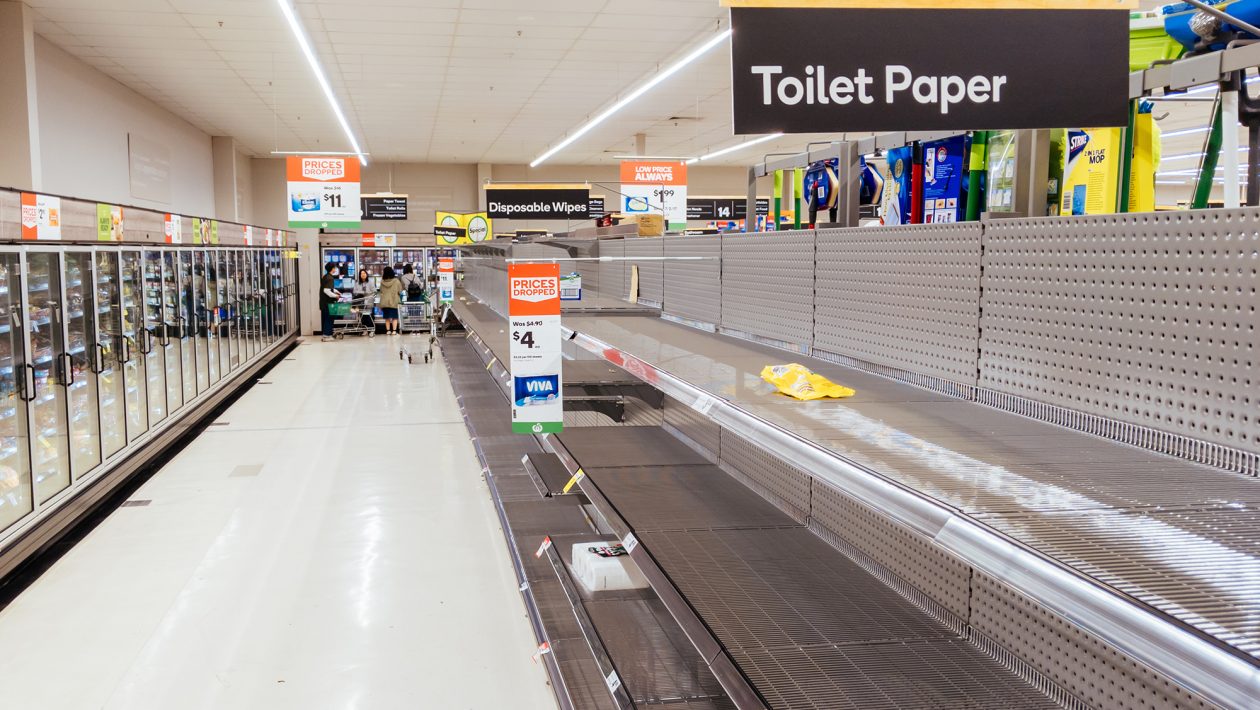It’s becoming a familiar sight to shoppers: An overhead sign directs them to the toilet paper aisle, but that aisle is nothing but empty shelves.
Like antibacterial hand gel, paper towels and now certain food items, bathroom paper has been hard to find for at least a couple of weeks, after some purchasers began buying in large quantities once word that the COVID-10 virus was hitting American shores.
Manufacturers say they’re working nonstop to make these products to replenish those supplies.
“I can confirm we have thousands of P&G (Proctor and Gamble) employees working around the clock to continue serving consumers as many of our products play an important role in maintaining healthy habits and a healthy home environment, both critically important at this time,” said Erica Noble, of P&G’s Global Company Communications.
A Georgia-Pacific statement said the average American household, of 2.6 people, uses about 409 regular toilet paper rolls a year in conventional times. Should the family decide not to leave the house at all, that would increase by 140 percent.
“Therefore, to last approximately two weeks, a two-person household would need nine double rolls. A four-person household would need 17 double rolls or nine mega rolls to last approximately two weeks.”
But some local shoppers were seen loading bathroom paper packages in up to three carts and rolling them through cashier lines. Others stocked up on hand sanitizer until that product ran out. After learning of at-home recipes, they started loaded their carts with strong rubbing alcohol and aloe gel. Pasta and spaghetti sauce soon became popular items. Food items eventually return sporadically to shelves, but the paper products remain hard to find.
“While the timing is uncertain due to many variables in the supply chain process, our primary focus is to do all we can to meet consumer demand,” the statement said. Production has been increased and distribution is being revised to manage how the products can get to stores, it said.
Private individuals can order supplies through the Georgia-Pacific website, but they may experience the same demand they see at retail outlets, the statement said. In addition, Georgia-Pacific gives retail outlets a higher priority, which it said is a faster way to get products into consumers’ hands.
So, how soon should bathroom paper get back on the shelves?
Molly’s Gourmet Market and Deli, 1255 Shell Road, managed to offer paper supplies as well as food to shoppers earlier this week. A Next Door notice that a bathroom paper supply was on the shelves sent shoppers to Martinez’s Walmart, 1021 Arnold Drive, where despite limits of one package per customer, paper towels and toilet paper soon disappeared.
Several major retailers were asked when normal supplies would return, but only a few responded.
Victoria Castro, Public Affairs manager for Save Mart, which operates the Lucky Supermarket, 1145 Arnold Drive, said her company is constantly moving products out of its warehouse, “so if something is not on the shelf today, we ask our customers to check back with us the next day.
“We have a steady stream of products coming in from our warehouses. We are working with our vendors and suppliers to ensure the ongoing of availability of high demand products like paper, cleaning and personal hygiene products,” she said. “We are working around the clock to replenish our shelves.”
Her company is limiting purchase quantities of high-demand products so as many people as possible would be able to restock their supplies, she said.
Furthermore, all Save Mart, FoodMaxx and Lucky Stores are dedicating shopping hours for older residents and high-risk populations, such as pregnant women and those with compromised immune systems. Those hours are 5 a.m. to 9 a.m. Tuesdays and Thursdays.
“We ask all of our guests to respect the early hours in our stores on Tuesday and Thursday to allow higher-risk guests to use the store,” she said. “We are relying on the community to use best judgement about whether or not to shop our stores during these hours.”
Walmart didn’t respond to requests but has told other agencies it’s experimenting with ways to meet demand, such as delivering directly to stores instead of through distribution centers.
Nor did Safeway answer the request for information, but the company has issued an online statement saying it’s replenishing inventory as quickly as possible. The company offers special shopping times, from store opening to 9 a.m. Tuesdays and Thursdays for older and vulnerable people.
It, too, is setting purchasing limits, suspending raincheck services and no longer is accepting returns, according to a statement by Vivek Sankaran, president and chief executive officer of Albertsons Companies.
Walgreens has a seniors-only hour starting at 8 a.m. Tuesdays but is offering drive-through and online shopping for certain merchandise.
Rite-Aid has said that because of high demand, orders may be delayed by up to several weeks.
Websites for Walgreens, Rite-Aid and CVS offer educational material about COVID-19.
Some shoppers are seeking alternatives to paper products, such as cloths instead of paper towels for cleaning up spills. Many have been using moist wipes instead of toilet paper. But that option creates its own problems.
Bathroom tissue is more fragile, breaking down in sanitary systems. Wipes – even the so-called “flushable” ones – are stronger, and instead of breaking apart, they can stick in pipes, causing a blockage. Disinfectant wipes, used for cleaning countertops and other surfaces, cause the same problem.
“Flushing wipes, paper towels and similar products down toilets will clog sewers and cause backups and overflows at wastewater treatment facilities, creating an additional public health risk in the midst of the coronavirus pandemic,” according to a California Water Resources Control Board statement issued through spokesperson George Kostyrko.
“Even wipes labeled ‘flushable’ will clog pipes and interfere with sewage collection and treatment throughout the state,” the statement said. Instead, wipes and paper towels should be discarded in trash receptacles.




